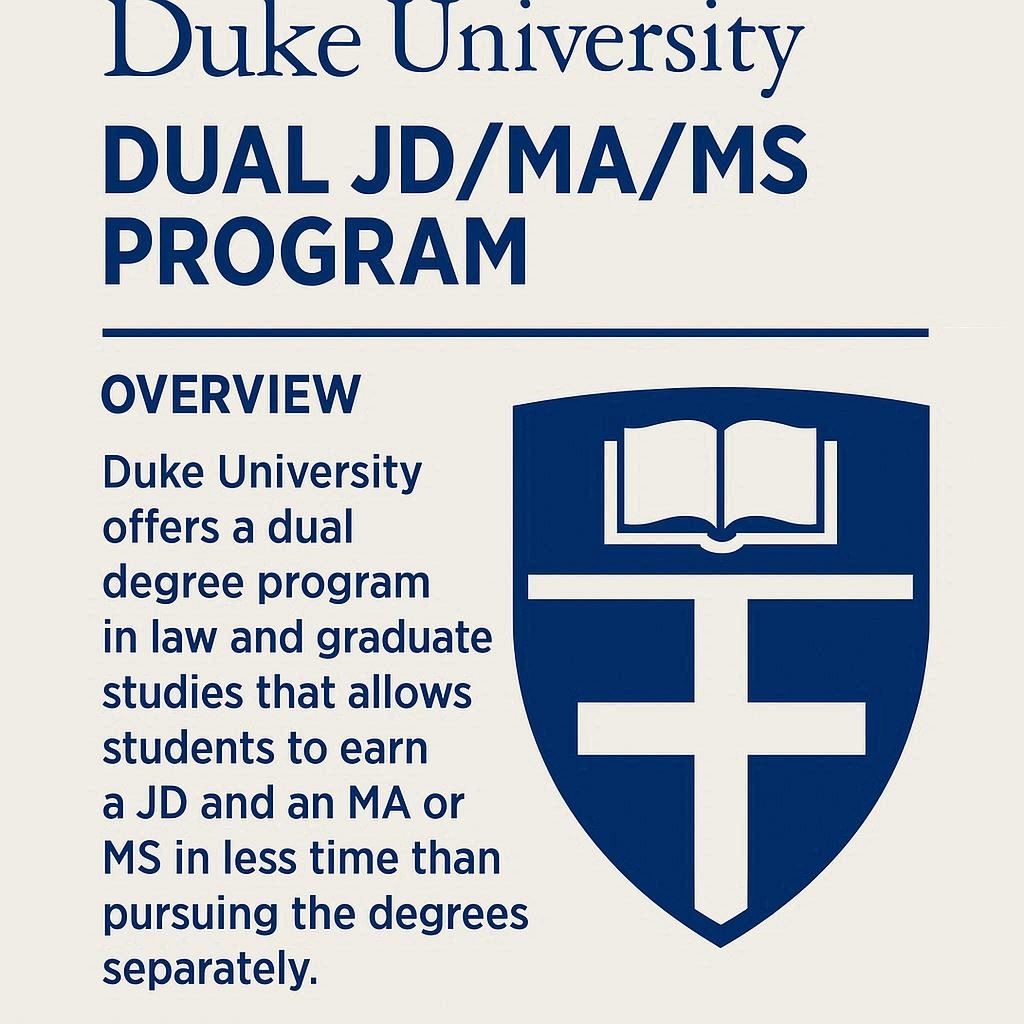Does Duke University have a dual JD/MA/MS program?
Yes, Duke University offers dual-degree programs that allow students to earn both a Juris Doctor (JD) and a Master of Arts (MA) or Master of Science (MS) degree concurrently. These programs are designed to integrate legal education with specialized knowledge in fields such as bioethics, science policy, public policy, and more.
JD/MA and JD/MS Dual-Degree Programs
Duke Law School collaborates with various departments within Duke University to offer joint JD/MA and JD/MS programs. These programs enable students to complete both degrees in a reduced timeframe, typically in three years and one summer. The specific MA or MS degrees available through these dual-degree programs include:
MA in Applied Ethics & Policy: This program focuses on the intersection of law, ethics, and policy, addressing complex issues in areas like bioethics, technology, and public policy. Students can choose specialized tracks such as Bioethics & Science Policy or Tech Ethics & Policy.
MA in History: For students interested in combining legal studies with historical analysis, this program offers an opportunity to delve into historical research while pursuing a legal career.
Master of Public Policy (MPP): Offered in collaboration with the Sanford School of Public Policy, this program allows students to integrate legal education with public policy analysis and leadership training.
Master of Environmental Management (MEM): In partnership with the Nicholas School of the Environment, this program combines legal studies with environmental science and policy, preparing students for careers in environmental law and policy.
Master of Theological Studies (MTS): Through the Divinity School, this program integrates legal education with theological studies, suitable for those interested in the intersection of law and religion.
Master of Science (MS) degrees: Various MS programs are available through the Graduate School, allowing students to combine legal education with scientific or technical expertise.
Program Structure and Admission
Application Process: Students typically apply to the dual-degree programs during their first semester of law school (1L year). Admission to both the JD program and the chosen MA/MS program is required.
Curriculum Integration: The dual-degree programs are structured to allow students to complete both degrees in an expedited timeframe. The specific course requirements and sequencing vary depending on the chosen MA/MS program.
Degree Conferral: Upon successful completion of the program requirements, students are awarded both the JD and the MA/MS degrees. Graduation typically occurs in the spring of the third year.
Career Opportunities
Graduates of the JD/MA and JD/MS dual-degree programs are well-equipped for careers that require both legal expertise and specialized knowledge in areas such as ethics, policy, public administration, environmental management, and more. These programs prepare students for roles in government agencies, nonprofit organizations, private sector firms, and academic institutions.
If you're interested in pursuing a dual-degree program at Duke University, it's advisable to review the specific requirements and application deadlines for the MA or MS program you're interested in. For more detailed information, you can visit the Duke Law School's dual-degree programs page: .
Summary Table
| Dual-Degree Type | Duration | Degree Pairing | Highlights |
|---|---|---|---|
| JD/MA (Applied Ethics & Policy) | 3 yrs + summer | JD + MA in Applied Ethics & Policy | Accelerated; capstone + interdisciplinary focus |
| JD/MA (Political Science) | Varies | JD + MA in Political Science | Graduate credits help shorten JD requirements |
| JD/MPP (Public Policy) | ~4 years | JD + MPP | Structured sequencing; applied policy focus |
| JD/MEM (Environmental Management) | ~4 years | JD + MEM | Environmental policy and management specialization |
| JD/MBA, JD/MTS, JD/MD, etc. | ~4–6 years | JD + diverse degrees (Business, Divinity, Med) | Multi-school collaboration across disciplines |
| JD/Master in Global Business Law | 3 years | JD + M2 from Sciences Po (Global Business Law) | International business law via Duke + Sciences Po |
Program Highlights
Customization — Many programs blend disciplinary depth with legal training, offering highly specialized career paths.
Interdisciplinary Opportunities — Whether it’s ethical implications of technology, environmental governance, or global markets, these programs equip lawyers with a broader analytic toolkit.
Time Efficiency — Accelerated options (like the JD/MA in Ethics & Policy) let students acquire two degrees without adding significant time to their JD.
Duke University offers a wide array of dual JD/MA/MS programs, allowing students to combine their legal education with advanced study in various complementary fields. These programs are designed to provide a rich interdisciplinary experience and enhance career opportunities.
Does Duke University Offer Dual JD/MA/MS Programs?
Yes, Duke University offers numerous dual degree programs combining a Juris Doctor (JD) with various Master of Arts (MA) and Master of Science (MS) degrees. These programs are a hallmark of Duke Law School's commitment to interdisciplinary education, preparing students for complex legal and professional landscapes.
Some of the prominent JD dual degree options include:
JD/MA in Applied Ethics & Policy: This program, in collaboration with the Duke Initiative for Science & Society, offers specializations in Bioethics & Science Policy or Tech Ethics & Policy.
JD/Master of Environmental Management (MEM): Offered through the Nicholas School of the Environment.
JD/Master of Public Policy (MPP): In conjunction with the Sanford School of Public Policy.
JD/Master of Theological Studies (MTS): Offered through Duke Divinity School.
JD/Master of Business Administration (MBA) & Accelerated JD/MBA: Through the Fuqua School of Business.
JD/Doctor of Medicine (MD): For those interested in the intersection of law and medicine.
While not strictly MA/MS, Duke also offers specialized JD/LLM (Master of Laws) dual degrees in International & Comparative Law and Law & Entrepreneurship, which are often completed in the same timeframe as the JD and provide a similar interdisciplinary advantage.
What Are the Requirements for a Dual JD/MA/MS Program at Duke?
The specific requirements vary for each dual degree program, but generally, applicants must meet the admission standards for both the Duke Law School and the respective graduate program (MA, MS, or other master's).
Common requirements often include:
Separate Applications: For many dual degree programs (e.g., JD/MBA, JD/MD, JD/MEM, JD/MPP, JD/MTS), you must apply separately to the Law School and the other graduate school/department. Each school will review your application independently and render separate admission decisions.
Standardized Tests: You will typically need to submit scores for the LSAT (required for all Law School dual degree applicants) and potentially other graduate-level tests like the GRE or GMAT, depending on the second degree program. However, for some programs, like the JD/MA in Applied Ethics & Policy, the Graduate School may waive the GRE requirement and accept LSAT scores.
Academic Transcripts: Official transcripts from all undergraduate and graduate institutions attended.
Letters of Recommendation: Usually two to three letters, often with a preference for academic recommendations.
Personal Statement and Essays: A personal statement for the JD application and additional essays or statements of purpose tailored to the specific MA/MS program, explaining your interest in the dual degree.
Resume/CV: Highlighting your academic, professional, and extracurricular experiences.
Interview (for some programs): Certain graduate programs might require an interview as part of their admissions process.
Duke Law JD Requirements: All JD students must fulfill core law school requirements, including prescribed first-year courses, an ethics requirement, a substantial research and writing project, and an experiential learning requirement.
It's highly recommended to consult the specific admissions pages for each dual degree program for detailed and up-to-date requirements.
How Long Does It Take to Complete a Dual Degree at Duke?
The duration for completing a dual JD/MA/MS program at Duke varies, but many are designed to be completed in a shorter timeframe than if the degrees were pursued sequentially.
Three Years: Some accelerated programs, such as the JD/LLM in International and Comparative Law, the JD/LLM in Law & Entrepreneurship, and the JD/MA in Applied Ethics & Policy, are structured to be completed in three years (plus one summer in some cases). This is often achieved by allowing a certain number of credits to count towards both degrees.
Four Years: Many other JD/master's dual degrees, such as the JD/MPP or JD/MBA, typically take four years to complete. This still represents a significant saving in time compared to pursuing each degree separately, which would normally take five years.
Individual Planning: The exact sequencing of coursework (e.g., spending the first year at the Law School or the other graduate school) can sometimes be flexible and might influence the overall timeline. Students work with advisors from both schools to plan their curriculum.
What Are the Benefits of a Dual JD/MA/MS Program?
Pursuing a dual JD/MA/MS degree at Duke offers numerous advantages, enhancing both academic depth and career prospects:
Interdisciplinary Expertise: Gain specialized knowledge and skills in two distinct but often complementary fields, preparing you for complex roles at their intersection. For example, a JD/MEM combines legal training with environmental management, ideal for environmental law or policy.
Increased Marketability: Dual degree holders often possess a unique and highly sought-after skillset, giving them a competitive edge in the job market, particularly for roles requiring both legal acumen and specialized knowledge.
Expanded Career Flexibility: Opens up a broader range of career paths and opportunities in areas like corporate law, public policy, healthcare management, entrepreneurship, and international law.
Time and Cost Efficiency: Completing two degrees concurrently is generally faster and often more cost-effective than pursuing them separately.
Networking Opportunities: Build a professional network across two distinct academic and professional communities, providing connections with diverse faculty, alumni, and industry leaders.
In-Depth Problem Solving: Develop a more holistic approach to problem-solving by understanding issues from both legal and disciplinary perspectives, leading to innovative solutions.
Accelerated Professional Specialization: Allows graduates to enter specialized professional fields sooner.
How to Apply for Dual Degree Programs at Duke University?
The application process for dual degree programs at Duke generally involves applying to both the Law School and the respective graduate program, though some integrated programs may streamline this.
Here's a general guide:
Identify Your Desired Program(s): Research the specific JD/MA/MS programs offered and their unique requirements.
Apply to Duke Law School:
Complete the regular JD application through LSAC (Law School Admission Council).
On the JD application form, indicate your intention to apply for the dual degree. Some programs, like the JD/LLM in International & Comparative Law, may only require an indication on the JD application without a separate application to the other school.
Submit all required JD application materials: application form, fee, resume, personal statement, short answer essays, transcripts, and LSAT score (or GRE for some programs), and two letters of recommendation through the LSAC Credential Assembly Service (CAS).
Apply to the Graduate School/Department:
For most dual degrees, you will concurrently submit a separate application to the relevant graduate school or department (e.g., Sanford School of Public Policy for JD/MPP, Nicholas School for JD/MEM).
Follow their specific application instructions, which will include their application form, essays (often including a statement of purpose explaining your interest in the dual degree), transcripts, letters of recommendation, and any required standardized tests (GRE/GMAT, if not waived).
Ensure you indicate on the graduate school application that you are also applying to Duke Law School for a dual degree.
Timing:
It's often recommended to apply to both programs simultaneously.
For some programs, it's possible to matriculate into one degree program (often the JD) and apply to the other during your first year of study. For example, JD/MA in Applied Ethics & Policy students typically apply during their 1L year. JD/MD students may apply for the JD concurrently with their MD application or during their first or second year of medical study.
Admissions Decisions: You will receive separate admission decisions from each school. If admitted to both, you can then formally accept your enrollment into the dual degree program.
It's crucial to pay close attention to the specific deadlines and instructions provided by both Duke Law School and the relevant graduate program, as they can vary.












